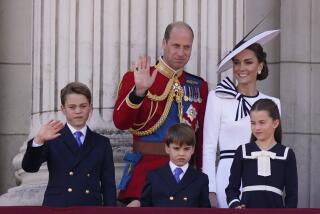Thousands Join Queen to Mark End of War in Pacific
- Share via
LONDON — Two minutes’ silence. An aged Lancaster bomber dropped a million red paper poppies over the crowd, and old men stood in the sun remembering young men who didn’t come back from the war with Japan.
Fifty years after Tokyo’s surrender brought an end to World War II, veterans from around the world joined Queen Elizabeth II and her family Saturday for a service of remembrance in front of Buckingham Palace.
Tens of thousands of spectators assembled on the parched lawns of Green Park and lined the broad avenue of the Mall leading to the palace.
“It’s 50 years, and it seems just like yesterday,” said spectator Sid Sirof of New York, a veteran of the Okinawa campaign.
After the brief silence, the old propeller bomber flew in low over Admiralty Arch, scattering its load of paper poppies in a wide arc over the palace.
The flowers fluttered down as the crowds heard the most famous lines of Lawrence Binyon’s poem “For the Fallen”: “At the going down of the sun and in the morning, we will remember them.”
About 18,000 veterans, including the queen’s husband, Prince Philip, then paraded past the monarch, who stood on a dais with Prince Charles, Princess Diana and their sons, Prince William and Prince Harry.
In turbans, bowler hats, panamas or regimental berets, the veterans saluted smartly as they passed the royal onlookers.
At sunset, the queen and Prince Philip boarded the royal yacht Britannia, anchored in the Thames River in front of the Tower of London, for a military air show.
For some, the ceremonies brought back bitter memories.
William Matthews, who served in Burma, now Myanmar, fought tears as he remembered how the Japanese treated the allied prisoners of war in the Far East.
“It’s just too terrible to talk about,” said Matthews. “It’s not that we hate the Japanese . . . but it’s just too difficult to forgive. Nothing will atone for the way we were treated.”
But many said the anniversary brought a symbolic end to their commemorations. A. R. Slater, who had worked in a hospital in Burma, said she enjoyed the ceremony.
“But this should be the last. Finished. Fifty years rounds it off nicely,” she said with a smile.
More to Read
Sign up for Essential California
The most important California stories and recommendations in your inbox every morning.
You may occasionally receive promotional content from the Los Angeles Times.













